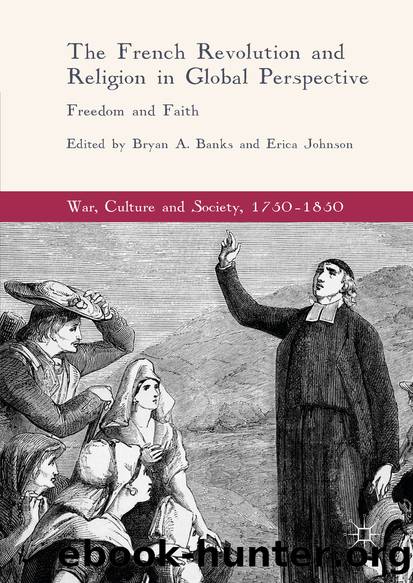The French Revolution and Religion in Global Perspective by Bryan A. Banks & Erica Johnson

Author:Bryan A. Banks & Erica Johnson
Language: eng
Format: epub
Publisher: Springer International Publishing, Cham
Even though Christianity seemed to have been incapable of enacting any substantial social change, Tocqueville believed that the Christian ideal of egalitarianism, when combined with the French revolutionary idea of political liberty, took on a renewed and invigorated purpose. It was the French who had the potential to transform the idea of Christian egalitarianism into a material, worldly reality. As implied earlier, eager to bolster Franceâs international moral standing in regards to the slavery issue, Tocqueville privileged the unique capacity of French universalism to provide justice to the subjugated and oppressed.
These essays on emancipation are critical for understanding Tocquevilleâs complex colonial policy, for they bear witness to his belief in the vital significance of Franceâs colonies for the nationâs international status, regardless of their political or monetary cost, and they display what Tocqueville conceived of as Franceâs moral obligations in the world. 17 Tocquevilleâs proclamations of Franceâs unique duty to the enslaved and uncivilized across the globe contain an underlying claim to moral and sociopolitical power over other European nation states, particularly Great Britain. Tocqueville believed that, if there was way for France to keep its colonies, it would come only from the abolition of slavery. 18
Importantly, Franceâs moral superiority in Europe was threatened by the continued existence of slavery in its colonies. Regardless of the fact that the British policy was proving itself more progressive than that of the French (the British abolished slavery in 1833), Tocquevilleâs claim that the âFrench sentimentsâ of equality and liberty undoubtedly intended to undercut Britainâs ethical position within Europe by highlighting Franceâs distinctively revolutionary, Christian heritage within public discourse. 19 In Tocquevilleâs writings, the Christian principle of equality and Franceâs Christian tradition legitimate and universalize Franceâs natural obligations to the chained and âbarbaricâ in Franceâs colonies while simultaneously bolstering its moral and, indirectly, its economic claims over other European nations. This contradictory justification of empire undoubtedly offered an ideological foundation for the mission civilisatrice in subsequent French colonial policy. Contrary to prevalent secularization narratives, a close reading of Tocqueville reveals that Christianityâs influence remained widespread in French society, though it became increasingly amalgamated into more temporal cultural fixtures, such as the civilizing mission, within secular liberal discourse.
Download
This site does not store any files on its server. We only index and link to content provided by other sites. Please contact the content providers to delete copyright contents if any and email us, we'll remove relevant links or contents immediately.
The Lost Art of Listening by Michael P. Nichols(7494)
Why I Am Not A Calvinist by Dr. Peter S. Ruckman(4149)
The Rosicrucians by Christopher McIntosh(3510)
Wicca: a guide for the solitary practitioner by Scott Cunningham(3167)
Signature in the Cell: DNA and the Evidence for Intelligent Design by Stephen C. Meyer(3130)
Real Sex by Lauren F. Winner(3014)
The Holy Spirit by Billy Graham(2944)
To Light a Sacred Flame by Silver RavenWolf(2814)
The End of Faith by Sam Harris(2733)
The Gnostic Gospels by Pagels Elaine(2527)
Waking Up by Sam Harris(2454)
Nine Parts of Desire by Geraldine Brooks(2361)
Jesus by Paul Johnson(2352)
Devil, The by Almond Philip C(2324)
The God delusion by Richard Dawkins(2305)
Heavens on Earth by Michael Shermer(2278)
Kundalini by Gopi Krishna(2180)
Chosen by God by R. C. Sproul(2161)
The Nature of Consciousness by Rupert Spira(2104)
